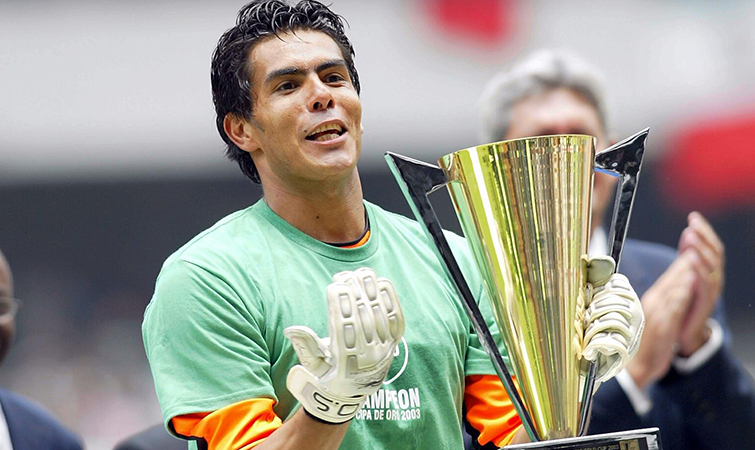MIAMI, Florida – This Friday at 7:00 PM ET, Concacaf will be airing a re-broadcast of two Concacaf Gold Cup classics, the first being the Group C finale between Honduras and El Salvador from the 2019 Gold Cup, followed by the 2011 Gold Cup Final between Mexico and the United States. Both matches will be shown on Concacaf’s Facebook and YouTube pages, plus the Concacaf App.
If anyone can speak to Gold Cup success, it is former Mexico GK Oswaldo Sanchez. The legendary stopper was a member of the 1996 and 2003 Mexico teams that took home top prize in the Gold Cup. The memories of defeating Brazil 2-0 in the 1996 Final and then Brazil again in the 2003 Final, 1-0, are still cherished by the 46-year-old.
“The 1996 Gold Cup was very exciting because I was very young and those were my first times with the national team. Mexico played very well and for me it was exciting because it was my first title with the Mexican national team, and that was magical because it opened a door to my national team career,” said Sanchez in an exclusive interview with Concacaf.com.
“2003 was a spectacular tournament because it was played in Mexico and also because my son was born during that time. I was able to be champion beating Brazil in the final and I was fortunate enough to be designated the Best Goalkeeper of the tournament, so I was very happy because I consolidated my status within the national team, plus winning the best GK award and my son being born,” said Sanchez.
Having played Gold Cup matches in both Mexico and the U.S., Sanchez pinpoints the biggest difference between playing matches on home soil and in the U.S.
“The difference between playing a big tournament in the U.S. and Mexico is that people are Mexico are accustomed to seeing you regularly playing in qualifiers, which makes the fans in Mexico more demanding. When you go to the U.S., all the Mexico fans are so happy to see their team playing so there is a lot of festivities around the game. It’s amazing and it’s because those Mexican people need that identity of seeing their national team while living in the U.S,” said Sanchez.
Not only did Sanchez secure the Golden Glove for the 2003 Gold Cup, but two years later he earned the same honor as Mexico finished fourth at the FIFA Confederations Cup.
“It was incredible. Brazil’s Dida was there, Oliver Kahn of Germany, there were many goalkeepers who were there of a great international level and for me it was very satisfying to be given the best GK award. Without a doubt it was my greatest individual achievement with the Mexican NT. To win an award at such a prestigious international tournament was wonderful,” said Sanchez.
It was also during the era when Ricardo La Volpe was Head Coach of the Mexican National Team. It is obvious to see the huge amount of respect that Sanchez holds for the tactical acumen of the Argentine manager.
“In my 25 years as a player I had a lot of coaches, but he was the best at being able to interpret to players what they needed to do on the field. All of the talks with him are about football. If you sit down with him at the table, he would grab the napkins, the salt and pepper shakers and speak about tactical movements. He’s obsessed with football and that was great because in that era, it gave us such a strong footballing identity. He is a coach who enriches you, he gives your precise lessons about football,” said Sanchez.
Even though his days as a Mexican National Team player have ended, Sanchez still closely follows El Tricolor, particularly in Gold Cup competition and Mexico’s 4-2 comeback win over the U.S. in the 2011 Final remains one of his favorites.
“It was magical because in the Rose Bowl in Pasadena there is an even more special atmosphere when Mexico plays. I think the bravery, personality and the ability of Mexico to react showed the true personality of the Mexican people, a people who are hard-working, that always shows up, that is sometimes undervalued, sometimes ignored, but in that game it was the consolidation of an important dream because it reflected all of those concepts,” said Sanchez.
Yet Sanchez also points to Mexico’s 2-1 defeat to Panama in the 2013 semifinals as an important lesson as to the virtues of increased competition in the region.
“I think the football in the Gold Cup gives chances to other countries to develop and improve themselves. I think that’s the great thing about competition in football, that at any moment anyone can beat anyone and I was glad for Panama to realize that they could compete. After that win, they gained a lot of confidence and ended up qualifying for Russia 2018. Panama football had been evolving and that was the bastion to take that step up.”
Sanchez also highlighted the 2015 Gold Cup Final, in which Mexico downed Jamaica 3-1. Perhaps more importantly, the tournament served as the passing of the leadership torch within the Mexican National Team from DF Rafael Marquez to MF Andres Guardado.
“I think that was the consolidation of Andres being the leader of the national team with Rafa Marquez’s exit. Now Andres is captain, he is a player of great hierarchy who has been with the national team since 2006 when La Volpe took him to the World Cup when he was 18. He has grown so much and he continues to play at a high level with his club, Betis, in Spain, so that Final was Andres Guardado’s consolidation as Mexico captain,” concluded Sanchez.




















